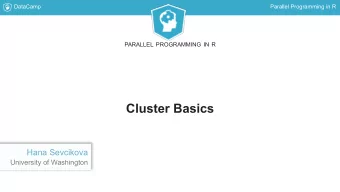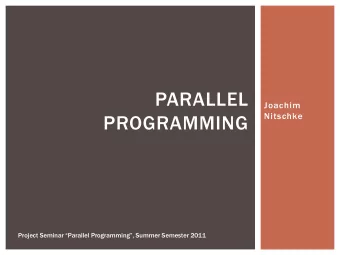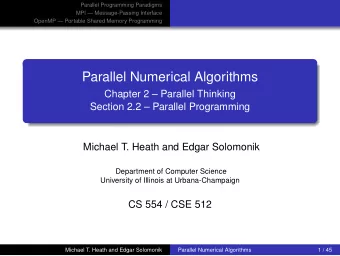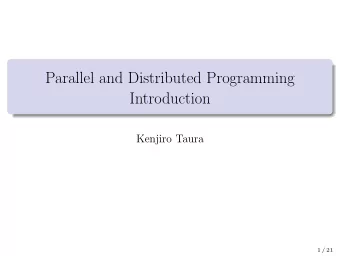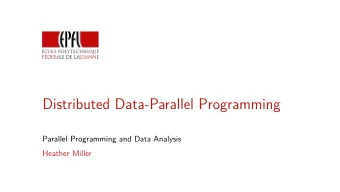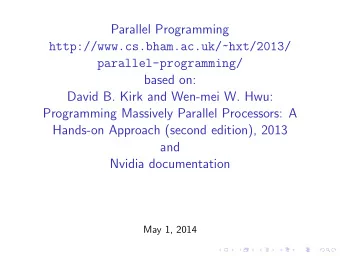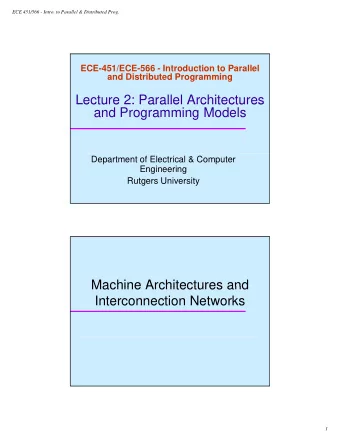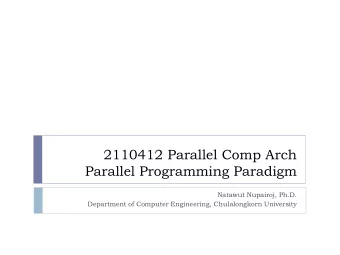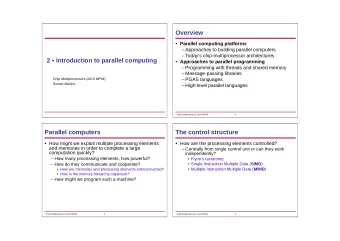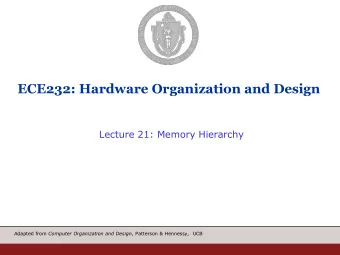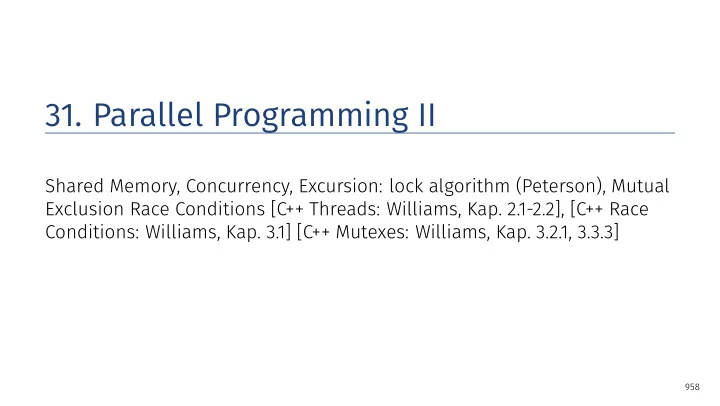
31. Parallel Programming II Shared Memory, Concurrency, Excursion: - PowerPoint PPT Presentation
31. Parallel Programming II Shared Memory, Concurrency, Excursion: lock algorithm (Peterson), Mutual Exclusion Race Conditions [C++ Threads: Williams, Kap. 2.1-2.2], [C++ Race Conditions: Williams, Kap. 3.1] [C++ Mutexes: Williams, Kap. 3.2.1,
31. Parallel Programming II Shared Memory, Concurrency, Excursion: lock algorithm (Peterson), Mutual Exclusion Race Conditions [C++ Threads: Williams, Kap. 2.1-2.2], [C++ Race Conditions: Williams, Kap. 3.1] [C++ Mutexes: Williams, Kap. 3.2.1, 3.3.3] 958
31.1 Shared Memory, Concurrency 959
Sharing Resources (Memory) Up to now: fork-join algorithms: data parallel or divide-and-conquer Simple structure (data independence of the threads) to avoid race conditions Does not work any more when threads access shared memory. 960
Managing state Managing state: Main challenge of concurrent programming. Approaches: Immutability, for example constants. Isolated Mutability, for example thread-local variables, stack. Shared mutable data, for example references to shared memory, global variables 961
Protect the shared state Method 1: locks, guarantee exclusive access to shared data. Method 2: lock-free data structures, exclusive access with a much finer granularity. Method 3: transactional memory (not treated in class) 962
Canonical Example class BankAccount { int balance = 0; public: int getBalance(){ return balance; } void setBalance(int x) { balance = x; } void withdraw(int amount) { int b = getBalance(); setBalance(b - amount); } // deposit etc. }; (correct in a single-threaded world) 963
Bad Interleaving Parallel call to widthdraw(100) on the same account Thread 1 Thread 2 int b = getBalance(); int b = getBalance(); t setBalance(b-amount); setBalance(b-amount); 964
Tempting Traps WRONG: void withdraw(int amount) { int b = getBalance(); if (b==getBalance()) setBalance(b - amount); } Bad interleavings cannot be solved with a repeated reading 965
Tempting Traps also WRONG: void withdraw(int amount) { setBalance(getBalance() - amount); } Assumptions about atomicity of operations are almost always wrong 966
Mutual Exclusion We need a concept for mutual exclusion Only one thread may execute the operation withdraw on the same account at a time. The programmer has to make sure that mutual exclusion is used. 967
More Tempting Traps class BankAccount { int balance = 0; bool busy = false; public: void withdraw(int amount) { while (busy); // spin wait busy = true; int b = getBalance(); setBalance(b - amount); busy = false; } // deposit would spin on the same boolean }; 968
More Tempting Traps class BankAccount { int balance = 0; bool busy = false; public: void withdraw(int amount) { does not work! while (busy); // spin wait busy = true; int b = getBalance(); setBalance(b - amount); busy = false; } // deposit would spin on the same boolean }; 968
Just moved the problem! Thread 1 Thread 2 while (busy); //spin while (busy); //spin busy = true; busy = true; t int b = getBalance(); int b = getBalance(); setBalance(b - amount); setBalance(b - amount); 969
How ist this correctly implemented? We use locks (mutexes) from libraries They use hardware primitives, Read-Modify-Write (RMW) operations that can, in an atomic way, read and write depending on the read result. Without RMW Operations the algorithm is non-trivial and requires at least atomic access to variable of primitive type. 970
31.2 Mutual Exclusion 971
Critical Sections and Mutual Exclusion Critical Section Piece of code that may be executed by at most one process (thread) at a time. Mutual Exclusion Algorithm to implement a critical section acquire_mutex(); // entry algorithm\\ ... // critical section release_mutex(); // exit algorithm 972
Required Properties of Mutual Exclusion Correctness (Safety) At most one process executes the critical section code Liveness Acquiring the mutex must terminate in finite time when no process executes in the critical section 973
Almost Correct class BankAccount { int balance = 0; std::mutex m; // requires #include <mutex> public: ... void withdraw(int amount) { m.lock(); int b = getBalance(); setBalance(b - amount); m.unlock(); } }; 974
Almost Correct class BankAccount { int balance = 0; std::mutex m; // requires #include <mutex> public: ... void withdraw(int amount) { m.lock(); int b = getBalance(); setBalance(b - amount); m.unlock(); } }; What if an exception occurs? 974
RAII Approach class BankAccount { int balance = 0; std::mutex m; public: ... void withdraw(int amount) { std::lock_guard<std::mutex> guard(m); int b = getBalance(); setBalance(b - amount); } // Destruction of guard leads to unlocking m }; 975
RAII Approach class BankAccount { int balance = 0; std::mutex m; public: ... void withdraw(int amount) { std::lock_guard<std::mutex> guard(m); int b = getBalance(); setBalance(b - amount); } // Destruction of guard leads to unlocking m }; What about getBalance / setBalance? 975
Reentrant Locks Reentrant Lock (recursive lock) remembers the currently affected thread; provides a counter Call of lock: counter incremented Call of unlock: counter is decremented. If counter = 0 the lock is released. 976
Account with reentrant lock class BankAccount { int balance = 0; std::recursive_mutex m; using guard = std::lock_guard<std::recursive_mutex>; public: int getBalance(){ guard g(m); return balance; } void setBalance(int x) { guard g(m); balance = x; } void withdraw(int amount) { guard g(m); int b = getBalance(); setBalance(b - amount); } }; 977
31.3 Race Conditions 978
Race Condition A race condition occurs when the result of a computation depends on scheduling. We make a distinction between bad interleavings and data races Bad interleavings can occur even when a mutex is used. 979
Example: Stack Stack with correctly synchronized access: template <typename T> class stack{ ... std::recursive_mutex m; using guard = std::lock_guard<std::recursive_mutex>; public: bool isEmpty(){ guard g(m); ... } void push(T value){ guard g(m); ... } T pop(){ guard g(m); ...} }; 980
Peek Forgot to implement peek. Like this? template <typename T> T peek (stack<T> &s){ T value = s.pop(); s.push(value); return value; } 981
Peek Forgot to implement peek. Like this? not thread-safe! template <typename T> T peek (stack<T> &s){ T value = s.pop(); s.push(value); return value; } 981
Peek Forgot to implement peek. Like this? not thread-safe! template <typename T> T peek (stack<T> &s){ T value = s.pop(); s.push(value); return value; } Despite its questionable style the code is correct in a sequential world. Not so in concurrent programming. 981
Bad Interleaving! Initially empty stack s , only shared between threads 1 and 2. Thread 1 pushes a value and checks that the stack is then non-empty. Thread 2 reads the topmost value using peek(). Thread 1 Thread 2 s.push(5); int value = s.pop(); assert(!s.isEmpty()); t s.push(value); return value; 982
The fix Peek must be protected with the same lock as the other access methods 983
Bad Interleavings Race conditions as bad interleavings can happen on a high level of abstraction In the following we consider a different form of race condition: data race. 984
How about this? class counter{ int count = 0; std::recursive_mutex m; using guard = std::lock_guard<std::recursive_mutex>; public: int increase(){ guard g(m); return ++count; } int get(){ return count; } } 985
How about this? class counter{ int count = 0; std::recursive_mutex m; using guard = std::lock_guard<std::recursive_mutex>; public: int increase(){ guard g(m); return ++count; } int get(){ not thread-safe! return count; } } 985
Why wrong? It looks like nothing can go wrong because the update of count happens in a “tiny step”. But this code is still wrong and depends on language-implementation details you cannot assume. This problem is called Data-Race Moral: Do not introduce a data race, even if every interleaving you can think of is correct. Don’t make assumptions on the memory order. 986
A bit more formal Data Race (low-level Race-Conditions) Erroneous program behavior caused by insufficiently synchronized accesses of a shared resource by multiple threads, e.g. Simultaneous read/write or write/write of the same memory location Bad Interleaving (High Level Race Condition) Erroneous program behavior caused by an unfavorable execution order of a multithreaded algorithm, even if that makes use of otherwise well synchronized resources. 987
We look deeper class C { int x = 0; int y = 0; public: void f() { x = 1; y = 1; } void g() { int a = y; int b = x; assert(b >= a); } } 988
We look deeper class C { int x = 0; int y = 0; public: void f() { A x = 1; B y = 1; } void g() { C int a = y; D int b = x; assert(b >= a); } Can this fail? } 988
We look deeper class C { There is no interleaving of f and g that int x = 0; would cause the assertion to fail: int y = 0; public: A B C D � void f() { A A C B D � x = 1; B y = 1; A C D B � } C A B D � void g() { C C C D B � int a = y; D int b = x; C D A B � assert(b >= a); It can nevertheless fail! } Can this fail? } 988
Recommend
More recommend
Explore More Topics
Stay informed with curated content and fresh updates.
